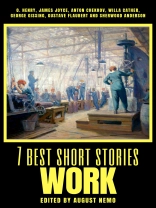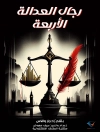Money – and the social effects of having it or not – is too big a theme in people’s daily lives to be ignored by literature. The writers gave the most varied interpretations and looked from the most different angles to the human relationship with money – but the final thought is always up to the reader.
The critic August Nemo selected seven classic short stories on this subject:
– Counterparts by James Joyce
– The Romance of a Busy Broker by O. Henry
– Sleepy by Anton Chekhov
– Neighbour Rosicky by Willa Cather
– An Old Maid’s Triumph by George Gissing
– The Egg by Sherwood Anderson
– A Simple Soul by Gustave Flaubert
For more books with interesting themes, be sure to check the other books in this collection!
लेखक के बारे में
William Wymark Jacobs (18631943) was an English author of short stories and novels. During his career he was best known for his farcical comedies involving dockside and rural Essex characters. He occasionally wrote horror stories, however, and today is most famous for ‘The Monkey’s Paw’ (1902).
William Sydney Porter (September 11, 1862 June 5, 1910), better known by his pen name O. Henry, was an American short story writer. His stories are known for their surprise endings.
James Augustine Aloysius Joyce (2 February 1882 13 January 1941) was an Irish novelist, short story writer, poet, teacher, and literary critic. He contributed to the modernist avant-garde and is regarded as one of the most influential and important authors of the 20th century. Joyce is best known for Ulysses (1922), a landmark work in which the episodes of Homer’s Odyssey are paralleled in a variety of literary styles, most famously stream of consciousness.
David Herbert Lawrence (11 September 1885 2 March 1930) was an English writer and poet. His collected works represent, among other things, an extended reflection upon the dehumanising effects of modernity and industrialisation. Some of the issues Lawrence explores are sexuality, emotional health, vitality, spontaneity, and instinct.
Hector Hugh Munro (18 December 1870 14 November 1916), better known by the pen name Saki, and also frequently as H. H. Munro, was a British writer whose witty, mischievous and sometimes macabre stories satirize Edwardian society and culture. He is considered a master of the short story, and often compared to O. Henry and Dorothy Parker. Influenced by Oscar Wilde, Lewis Carroll and Rudyard Kipling, he himself influenced A. A. Milne, Noël Coward and P. G. Wodehouse.
Francis Scott Key Fitzgerald (September 24, 1896 December 21, 1940) was an American fiction writer, whose works helped to illustrate the flamboyance and excess of the Jazz Age. While he achieved popular success, fame, and fortune in his lifetime, he did not receive much critical acclaim until after his death. Perhaps the most notable member of the ‘Lost Generation’ of the 1920s, Fitzgerald is now widely regarded as one of the greatest American writers of the 20th century.
Fyodor Mikhailovich Dostoevsky (11 November 1821 9 February 1881), sometimes transliterated Dostoyevsky, was a Russian novelist, short story writer, essayist, journalist and philosopher. Dostoevsky’s literary works explore human psychology in the troubled political, social, and spiritual atmospheres of 19th-century Russia, and engage with a variety of philosophical and religious themes.












